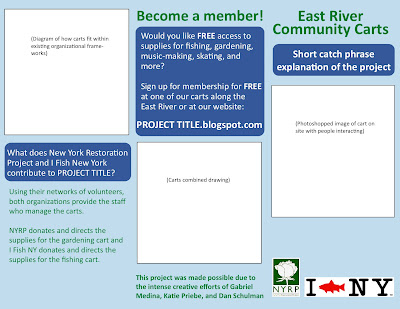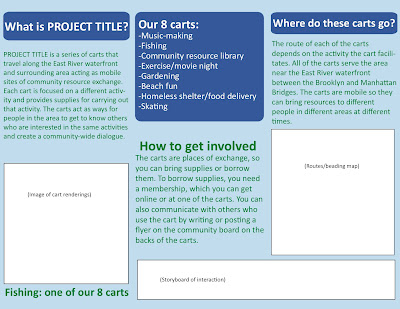Monday, December 14, 2009
Volunteers and Networks
http://www.nyrp.org/Calendar_Programs/Corporate_Volunteer_Program
http://www.nyrp.org/Calendar_Programs/NYRP_Volunteer_Corps/NYRP_Volunteer_Corps_Sign-up
https://www.nyrp.org/Donate_and_Membership/Buy_an_NYC_Tree
These links are the basis for what will be a plan for our base of volunteers/ worker structure.
I still need to map it out officially though. I hope it is okay. I will have it finished for when we see elliot though.
Saturday, December 5, 2009
Quick sketch of how carts park together
Work in progress: project brochure


Title!
We need to think of a title for the cart program! Any ideas?
Here is a list of words that we were brainstorming with in class:
waterfront
connections/connected
mobile
East River
carts
sharing
borrowing
beads
bridging/bridges
"community carts: connecting people along the east river waterfront"?
Friday, December 4, 2009
LIST OF THINGS FOR FINAL
List of things to do for FINAL:
1. 3D renderings of template cart with 2 storage views (spaces for fishing and gardening equipment; compartments for storage fold out from interior to exterior/ reference Katie’s drawings on blog for what kinds of things need to be stored, especially garden cart) GABRIEL
2. Beading map of existing fishing and gardening nodes and potential sites (show how they might overlap) GABRIEL
3. Diagram of how carts fit within existing organizational frameworks (volunteers and supplies) DAN
4. Storyboard of how to interact with cart (to go on side of cart), for community audience DAN
5. Storyboard that shows how carts are interacting with community, for jurors KATIE
6. Quick drawing of how the carts combine when closed down and parked GABRIEL, DAN, KATIE
7. Brochure addressing community that explains cart program in general (mission, services/supplies) KATIE
8. Website for presentation (mockup for program) ALL
9. Photoshopped collage of cart drawing on site KATIE
Tuesday, December 1, 2009
Online conversation for Friday's class
"so things to have for Friday:
[1] ongoing conversation > clarity about what their design entails, what needs to be developed
[2] list of drawings [and maybe some completed drawings?]
[3] clear team agenda for working on Friday
[4] individual working definition of public space [4-5 sentences] - please email this to me before Friday am."
Here are my thoughts:
1. Like I said in my email last week, I think we still need to develop the form our 'mobile things' are going to take, as well as the plug-ins. I think we also need to figure out who would be in charge of carrying out these community centers. If we are thinking about having specific organizations, I have done some research related to organizations that could potentially provide volunteers or resources for fishing or gardening activities.
2. I'm not sure what other drawings we would need besides different variations of the mobile thing and plug-ins.
3. Any ideas about what we should do on Friday? Maybe divide up the drawings and each of us could work on their drawing in class. Dan, if you want to do a drawing not on the computer, let me know because I have lots of colored pencils and markers.
4. Public space is an arena where a variety of persons have the freedom to convene for different reasons and with different uses in mind. Because definitions of use are open-ended, public space allows for groups with different interests to intermingle and then create new uses. Public space does not have to be officially designated open space in order to be public; as long as it is free and accessible to anyone and used by a number of people, it is public space.

